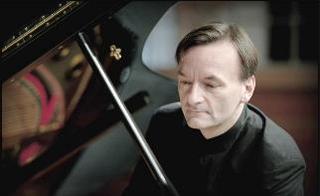|
Back
Beethoven Without Tumult New York
David Geffen Hall, Lincoln Center
01/11/2017 - & January 12, 13, 14, 2017
Ludwig van Beethoven: Piano Concerto No. 5 in E-flat major “Emperor”, Opus 73
Johannes Brahms: Symphony No. 3 in F major, Opus 90
Stephen Hough (Pianist)
New York Philharmonic Orchestra, Alan Gilbert (Conductor) 
S. Hough (© Sim Canetty-Clarke)
What should have been a matter of “Keys and Symphony” last night sadly turned into “Keys and Sympathy.”
I had promised to visit a dear relative recuperating in a hospital, yet there was no way to resist hearing Stephen Hough in Beethoven’s mightiest concerto. So–forgive me, ConcertoNet and New York Phil Public Relations office–I left after the “Emperor” Concerto, assured that Alan Gilbert would command Brahms’ Third Symphony without me in the audience.
The relative was happy, since my own elation at hearing Mr. Hough carried all the way to the hospital, an agreeable enough infection.
When listening to Mr. Hough–who is burdened with the cognomen “Britain’s Best-Loved Pianist”–one tries to ignore his facility as a balletomane, artist, political activist and stunning columnist in his own country. Yet that isn’t difficult, since he is so sure-handed, such a–forgive the world–likeable artist. Even in the Beethoven Fifth, not once was he imperious, not once did he substitute Zeus for Apollo. It was a beautiful, almost understated performance, from the very first octave runs.
It was evident that Hough and Gilbert have a great personal affinity. From those beginning notes, the conductor allowed the pianist to proceed with nuances, with changes in mood and–what Mr. Hough does better than anyone else–to give the most infinitesimal pause while coming to the end of a phrase. Such a velvet touch does he have–velvet without being affected–that those pauses gave this listener a sense of the most minute levitation.
Other pianists may pay heed to the “imperial” nickname for the concerto. But this was not Beethoven’s choice, and Mr. Hough continued by alternatively offering the most subtle colors, as well as rare dialogues with the orchestra. No pause was offered for the start of Beethoven’s cadenza. Mr. Hough was never aggressive, never the exhibitionist (which he had every right to be), but allowed the music, rather than the fingers, to capture the moment.
I had no problem with his turning the Adagio into an Andante. This was to be an amicable Fifth Concerto, not with the heavy depth of older European pianists. And he played it with a lyrical state of mind. To put us in the mood for lovely playing rather than a portentious movement.
Somebody once said that Beethoven could never write a good finale, and yes, no matter what the first two movements, he always ended up with some dancing. Mr. Hough, alas, took that to the nth degree. His opening octave runs were a bit sloppy (the repeats were perfect), nor did he give that sense of animation. If this was a bit disappointing, we still had those first two movements, elevating the composer, himself and–more than rarely–ourselves.
Harry Rolnick
|